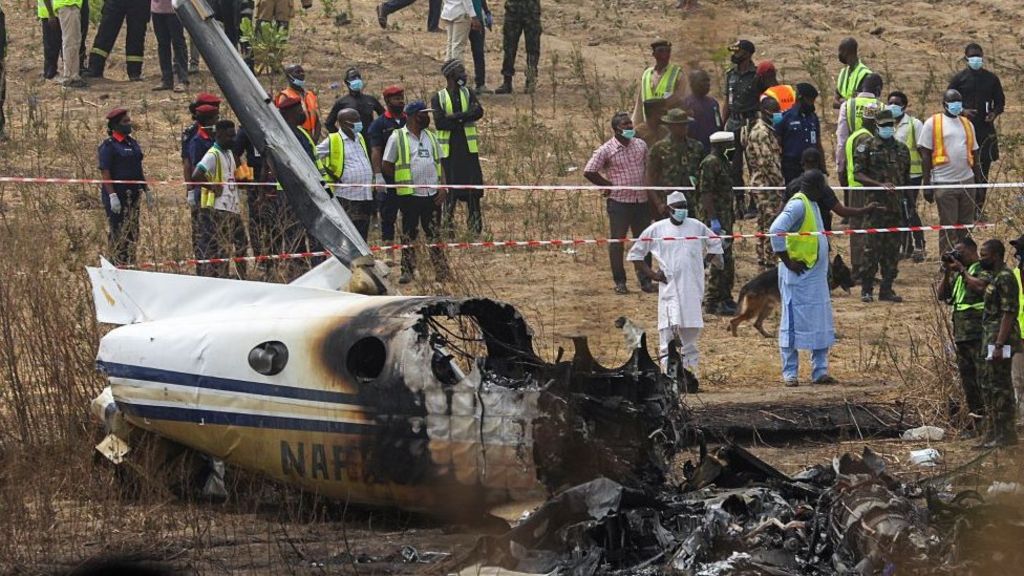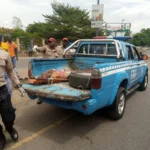The Nigerian Air Force (NAF) on Thursday buried the remains of seven young officers who died on February 21 when their Beechcraft KingAir B350i (NAF 201) aircraft crashed while returning to the Nnamdi Azikiwe International Airport, Abuja.
The aircraft had reported engine failure enroute Minna, where it was conducting missions towards securing the release of the abducted 42 students, staff and family members of Government Science College Kagara, Niger State.
- A month after Oyo Fulani eviction: Sarkin Fulani, Asigangan of Igangan quibble over compensation
Gunmen slit throats of father, 2 sons in Zamfara community
Bandits had penultimate Wednesday February 17, abducted 27 students, three staff and 12 members of their families and the NAF aircraft and personnel were detailed to conduct Intelligence, Surveillance and Reconnaissance (ISR) missions over Niger State and its environs in aid of the rescue mission.
The seven NAF personnel were buried at the National Military Cemetery, Abuja with full military honours.
The seven personnel are: Flight Lieutenant Haruna Gadzama (Captain), Flight Lieutenant Henry Piyo (Co-Pilot), Flying Officer Michael Okpara (Airborne Tactical Observation System (ATOS) Specialist), Warrant Officer Bassey Etim (ATOS Specialist), Flight Sergeant Olasunkanmi Olawunmi (ATOS Specialist), Sergeant Ugochukwu Oluka (ATOS Specialist), Aircraftman Adewale Johnson (Onboard Technician).
Family members and friends of the deceased officers, including serving military personnel, could not hide their emotions during the burial ceremony attended by Ekiti State Governor Kayode Fayemi, members of the National Assembly, ministers, service chiefs, serving and retired military officers.
Amidst tears, Mrs Oluwasola Sola, elder sister of Olawunmi (ATOS Specialist), said her brother was on leave when he was called by his superior officer to report for the operation. She lamented that before the incident, the late flight sergeant was the only one taking care of the family members, particularly their aged mother, three children, including a year-old son.
At the burial, each of the seven families were presented with the national colours by Chief of Air Staff, Air Vice Marshal Isiaka Oladayo Amao.
The Chief of the Air Staff, describing the deceased as some of the finest officers of the NAF, and prayed to God to console their immediate families.
In line with Standard Operating Procedure (SOP), AVM Amao, has since ordered an immediate investigation into the incident.
The crash of aircraft and the loss of personnel always come with heavy toll on the NAF. For example, ahead of the daily rehearsal for display during Nigeria’s 58th independence anniversary slated for October 1, 2018, two Air Force planes crashed in the Katampe area of Nigeria’s capital, Abuja. Unfortunately, one of the two pilots who ejected from the F-7Ni fighter jet died.
On January 2, 2019, a NAF helicopter crashed in combat while providing close air support to troops of 145 Battalion at Damasak in Northern Borno State.
In June 2019, another NAF helicopter crashed in the process of landing while returning from an anti-banditry combat mission in the Northwest Theatre under Operation Hadarin Daji.
These are air crashes and loss of personnel too many. It is good that the NAF has already set up a board of inquiry to ascertain the cause of the crash. It should go a step further by releasing and implementing the recommendations of the report.
This is because the death of the seven NAF personnel registers another major loss to the country. Training of pilots, flight engineers and crew is costly and takes a long time. Now, all these human resources are gone.
In addition, the NAF should activate its welfare programmes and ensure that families of the crash victims are taken care of. After all, they paid the supreme sacrifice to ensure peace and security in the country.

 Join Daily Trust WhatsApp Community For Quick Access To News and Happenings Around You.
Join Daily Trust WhatsApp Community For Quick Access To News and Happenings Around You.


